Unlock the benefits of cooking with bronze utensils! Discover what you need to know for a better culinary experience.
Outline
Introduction to Bronze Utensils
- What are bronze utensils?
- Brief history of bronze utensils.
Benefits of Cooking with Bronze Utensils
- Health benefits.
- Cooking advantages.
- Durability.
Facts about Bronze Utensils
- Composition.
- Conductivity.
- Versatility.
Maintenance of Bronze Utensils
- Cleaning tips.
- Preservation methods.
- Common mistakes to avoid.
Comparison with Other Utensils
- Bronze vs. stainless steel.
- Bronze vs. aluminum.
Cultural Significance
- Traditional use.
- Symbolism in different cultures.
Common Misconceptions
- Myths about bronze utensils.
- Debunking misconceptions.
Environmental Impact
- Sustainability of bronze.
- Recycling benefits.
Expert Recommendations
- Chef endorsements.
- Consumer testimonials.
Conclusion
Is Bronze Utensils Good for Cooking: Benefits, Facts, Maintenance, and More
Introduction to Bronze Utensils
Bronze utensils have been a staple in kitchens for centuries, valued for their unique properties and versatility in cooking. With a blend of copper and tin, bronze utensils offer a distinct cooking experience that sets them apart from other materials.
Benefits of Cooking with Bronze Utensils
When it comes to health and culinary advantages, bronze utensils shine. Unlike some other materials, bronze is naturally antimicrobial, inhibiting the growth of bacteria and ensuring safer food preparation. Additionally, the conductivity of bronze allows for even heat distribution, preventing hot spots and ensuring thorough cooking. Moreover, bronze utensils are renowned for their durability, lasting for generations with proper care.
Facts about Bronze Utensils
Bronze is an alloy typically composed of approximately 90% copper and 10% tin, although the exact proportions may vary. This composition gives bronze its unique properties, including excellent heat conductivity and resistance to corrosion. Its versatility extends beyond cooking utensils to include decorative items and artifacts due to its malleability and attractive appearance.
Maintenance of Bronze Utensils
To maintain the beauty and functionality of bronze utensils, regular cleaning is essential. Avoid harsh abrasives and opt for mild soap and warm water instead. Additionally, applying a thin layer of oil after cleaning can help prevent tarnishing and maintain the luster of the utensils. Be sure to dry thoroughly after washing to prevent water spots.
Comparison with Other Utensils
Compared to stainless steel, bronze utensils offer superior heat conductivity, making them ideal for precise cooking tasks such as tempering chocolate or sautéing delicate ingredients. Similarly, bronze outperforms aluminum in terms of durability and longevity, ensuring that your investment in bronze utensils will withstand the test of time.
Cultural Significance
Throughout history, bronze utensils have held cultural significance in various societies. From ceremonial objects to everyday kitchen essentials, bronze has been revered for its practicality and aesthetic appeal. In many cultures, the use of bronze utensils is intertwined with tradition and symbolism, enriching culinary rituals and family gatherings.
Common Misconceptions
Despite their numerous benefits, bronze utensils are often subject to misconceptions. One common myth is that bronze utensils are difficult to maintain, but with proper care, they can last for generations. Additionally, some believe that bronze utensils impart a metallic taste to food, but in reality, the tin content in bronze minimizes any flavor transfer.
Environmental Impact
From an environmental perspective, bronze is a sustainable choice for kitchen utensils. Both copper and tin are recyclable materials, reducing the need for new mining and conserving natural resources. By opting for bronze utensils, consumers can contribute to a more eco-friendly kitchen while enjoying the benefits of a time-honored material.
Expert Recommendations
Renowned chefs and culinary experts often endorse bronze utensils for their superior performance and aesthetic appeal. With their ability to conduct heat evenly and their durability, bronze utensils are favored by professionals and home cooks alike. Testimonials from satisfied customers further attest to the value of incorporating bronze utensils into the kitchen.
Conclusion
In conclusion, bronze utensils offer a range of benefits that make them an excellent choice for cooking enthusiasts. From their health advantages to their cultural significance, bronze utensils continue to be prized for their unique properties and timeless appeal. By understanding the facts and proper maintenance techniques, individuals can enjoy the beauty and functionality of bronze utensils for years to come.
FAQs
Do bronze utensils require special care?
- While bronze utensils benefit from regular cleaning and occasional oiling, they are relatively low maintenance compared to other materials.
Can bronze utensils be used with acidic ingredients?
- Yes, bronze utensils are safe to use with acidic ingredients; however, prolonged exposure may cause slight discoloration, which is purely cosmetic and does not affect the utensils’ performance.
Are bronze utensils suitable for all cooking surfaces?
- Bronze utensils are compatible with most cooking surfaces, including gas, electric, and induction cooktops.
Do bronze utensils react with food?
- No, bronze utensils are inert and do not react with food, ensuring the integrity of your culinary creations.
How long do bronze utensils last?
- With proper care, bronze utensils can last for generations, making them a worthwhile investment for any kitchen.
- Product on sale
 HANDCRAFTED KANSA BRONZE BABY GLASSOriginal price was: ₹1,650.00.₹899.00Current price is: ₹899.00.
HANDCRAFTED KANSA BRONZE BABY GLASSOriginal price was: ₹1,650.00.₹899.00Current price is: ₹899.00. - Product on sale
 BRONZE DOSA TAWA₹8,999.00 – ₹10,199.00
BRONZE DOSA TAWA₹8,999.00 – ₹10,199.00 - Product on sale
 BRONZE PARUPPU URULI₹3,333.00 – ₹6,444.00
BRONZE PARUPPU URULI₹3,333.00 – ₹6,444.00 - Product on sale
 BRONZE COOK POT WITH LID PONGAL PAANAI VENGALAM₹2,799.00 – ₹5,199.00
BRONZE COOK POT WITH LID PONGAL PAANAI VENGALAM₹2,799.00 – ₹5,199.00 - Product on sale
 BRONZE KUZHI KARANDI₹499.00 – ₹719.00
BRONZE KUZHI KARANDI₹499.00 – ₹719.00 - Product on sale
 ANTIQUE BRONZE POTOriginal price was: ₹13,980.00.₹10,899.00Current price is: ₹10,899.00.
ANTIQUE BRONZE POTOriginal price was: ₹13,980.00.₹10,899.00Current price is: ₹10,899.00.





















